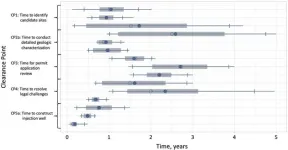(Press-News.org) Healthcare workers will be relieved to know that hospital coffee machines are not responsible for spreading disease and a general ban doesn’t seem necessary, finds a study published in the Christmas issue of The BMJ.
In a bid to eliminate hospital acquired (nosocomial) infections, various objects have been investigated as breeding grounds for bacteria including doctors’ ties and even hospital Bibles.
But despite being regularly touched by lots of bare hands, the potential of hospital coffee machines as a source of infection had not previously been explored.
To address this, researchers in Germany assessed the microbial population in healthcare associated coffee machines, with a focus on the World Health Organization’s high priority “ESKAPE” pathogens (Enterococcus faecium, Staphylococcus aureus, Klebsiella pneumoniae, Acinetobacter baumannii, Pseudomonas aeruginosa, and Enterobacter species).
These bacteria pose an increasing threat because they are resistant to many antibiotics and can lead to fatal bloodstream or catheter associated infections.
From 31 October to 31 December 2022 the researchers swabbed a total of 25 coffee makers spanning a range of fully automatic, capsule (such as Nespresso), and espresso machines.
Seventeen were from break rooms and offices at a university hospital’s Department of Anaesthesiology and Intensive Care Medicine and at the Institute for Medical Microbiology, Immunology, and Hygiene, both in Cologne, Germany. A further eight were in staff members’ homes.
All coffee makers had been in use for at least a year, and none was specially cleaned before sampling. There was no current disease outbreak at any of the locations at the time of sampling.
Each of the coffee makers was swabbed at five specified sites on the machine: the drip tray, the outlet, the buttons, the handle of the water tank, and the inside of the water tank.
Species were identified from cultures using spectrometry. Typical pathogens were grouped into “medically relevant“ and commensals into “atypical pathogens“ and differentiated by Gram type: positive or negative (the latter have an outer membrane, which aids antibiotic resistance).
Unsurprisingly, microbial growth was detected on every coffee machine and hospital machines were about three times as heavily colonised (360 strains isolated from 72 positive swabs) as home machines (135 strains isolated from 34 positive swabs).
Most detected species were commensals (bacteria that live on the skin or in the gut and pose no threat to health). Only a few medically relevant and no antibiotic resistant pathogens were identified.
Among the eight types of medically relevant Gram negative species detected, 81% were found in coffee makers at the hospital, mainly collected from drip trays, outlets, and water tank handles, emphasising the need to follow hand hygiene protocols.
Staphylococcus aureus was the only possibly Gram positive disease causing species collected: once on the buttons of a home coffee maker and once on the inside of a water tank at the hospital, suggesting that users’ hands touch even unlikely parts of the machines, note the authors.
“To our great relief, despite their potential for pathogen origins in nosocomial outbreaks, a general ban on coffee makers doesn’t seem necessary,” they write. What’s more, the study has reportedly resulted in extensive cleaning measures.
They add: “Our thoughts now turn to tea drinking nations. Are teapots, kettles, and hot water spouts similar breeding grounds for bacteria? Are the high temperatures in the pots sufficient to kill all potential pathogens? And what about the handles?”
END
Hospital coffee machines get a clean bill of health
Study suggests a general ban doesn’t seem necessary
2023-12-19
ELSE PRESS RELEASES FROM THIS DATE:
Common drug for cardiac failure jams a debated blood test for Alzheimer’s disease
2023-12-19
Alzheimer’s disease (AD) is associated with damaging protein aggregates in the brain, with β-amyloid (Aβ) aggregates called plaques being the key pathology. Entresto (sacubitril/valsartan) is a combined neprilysin inhibitor and angiotensin receptor blocker, approved for the treatment of heart failure. Concerns were raised by the FDA that this neprilysin inhibition treatment may increase the risk of AD, since neprilysin is one of the main enzymes responsible for degrading Aβ in the brain. The PERSPECTIVE trial (NCT02884206) showed that 3-year neprilysin inhibition treatment was not associated ...
Disadvantaged children’s struggles at school have “little to do” with character, attitude or a lack of ‘growth mindset’
2023-12-19
The relative underperformance of disadvantaged students at school has little do with them lacking the ‘character’, attitude, or mindset of their wealthier peers, despite widespread claims to the contrary, new research indicates.
The study, which analysed data from more than 240,000 15-year-olds across 74 countries, challenges the view often invoked by politicians and educators that cultivating self-belief or ‘growth mindsets’ can reduce class-based learning gaps. Researchers found that no more than 9% of the substantial achievement gap between ...
Unveiling molecular origami: A breakthrough in dynamic materials
2023-12-19
Origami, traditionally associated with paper folding, has transcended its craft origins to influence a diverse range of fields, including art, science, engineering, and architecture. Recently, origami principles have extended to technology, with applications spanning solar cells to biomedical devices. While origami-inspired materials have been explored at various scales, the challenge of creating molecular materials based on origami tessellations has remained. Addressing this challenge, a team of researchers, led by Professor Wonyoung Choe in the ...
Scientists spread festive cheer as research reveals Christmas dinner can be healthy
2023-12-19
In less than a week’s time, families around the country will be sitting down to tuck into their traditional Christmas dinner.
While the festive season is often a time of overindulgence, could parts of a festive banquet actually help improve our health?
Experts at Newcastle University, UK, have been researching the different characteristics and compounds of festive trimmings and have found that some of the side-dishes offer significant benefits.
Fighting chronic conditions
Soggy sprouts should be off the menu say Newcastle researchers – ...
U.S. utilities on track to be 100% renewable by 2060
2023-12-18
Utilities in the United States have pledged to transition to 100% renewable electricity by 2060, and although state mandates have played a role, it’s the utilities, themselves, that are leading the transition.
“Many people feel the transition on the policy side isn’t going fast enough,” said Matthew Burgess, a CIRES fellow, CU Boulder assistant professor, and co-author of the paper published today in Climatic Change. “But the private sector is moving faster than we thought. A lot has ...
Giant bacterium uses unique processes to power itself
2023-12-18
Not all bacteria are created equal.
Most are single-celled and tiny, a few ten-thousandths of a centimeter long. But bacteria of the Epulopiscium family are large enough to be seen with the naked eye and 1 million times the volume of their better-known cousins, E. coli.
In a study published Dec. 18 in Proceedings of the National Academy of Sciences, researchers from Cornell and Lawrence Berkeley National Laboratory have for the first time described the full genome of one species of the family of giants, which they’ve named Epulopiscium viviparus.
“This incredible giant bacterium is unique and interesting ...
Quantifying barriers to establishing sequestration wells
2023-12-18
Carbon capture and sequestration (CCS), the process of capturing and storing atmospheric carbon dioxide, is one method of reducing the amount of carbon dioxide in the atmosphere in efforts to reduce the impacts of climate change. While CCS is an essential tool in decarbonizing the U.S. economy, there are barriers that exist to the development, approval, and implementation of a geologic sequestration site, as it requires an appropriate geologic formation, as well as an approved injection facility.
Recent work from the Carnegie Mellon University Department of Engineering and Public Policy (EPP) estimates the time required to develop, approve, and implement ...
Sylvester cancer researcher and technology innovator named fellow of the National Academy of Inventors
2023-12-18
MIAMI, FLORIDA (Dec. 18, 2023) – Shanta Dhar, Ph.D., assistant director of Technology and Innovation at Sylvester Comprehensive Cancer Center at the University of Miami Miller School of Medicine, has been named a fellow of the National Academy of Inventors.
Her research focuses on ways to overcome barriers to precisely target mitochondria – the part of each cell that generates the energy needed for biochemical reactions. Her inventions and innovative contributions in nanomedicine, mitochondria-targeted drug delivery, and platinum-based prodrugs help guide targeted therapies in cancer and other diseases.
Dhar, an associate professor of biochemistry and molecular biology ...
Team led by UMASS Amherst discovers how to sabotage antibiotic-resistant ‘superbugs’
2023-12-18
Antibiotic-resistant “superbugs” that can defeat efforts to kill them are an urgent public health crisis, and according to the Centers for Disease Control, more than 2.8 million antibiotic-resistant infections occur each year. Researchers across the world are scrambling to meet the challenge. A collaborative team of researchers led by the University of Massachusetts Amherst and including scientists from the biopharmaceutical company Microbiotix recently announced that they had successfully learned how to sabotage a key piece of machinery that pathogens use to infect their host cells, and have developed a test to identify the next-generation drugs ...
How effective are opioid medications for cancer pain?
2023-12-18
Researchers examining the data on opioids for pain caused by cancer have found surprisingly large gaps in evidence regarding the true benefits of these medicines for cancer pain. The review challenges the commonly held view that opioids are the most powerful pain relievers.
The University of Sydney-led review highlights there is no ‘one size fits all’ treatment approach for cancer pain, urging health professionals and patients to carefully weigh up the evidence when deciding on a suitable pain management plan.
Opioid pain relievers are the most common treatment for cancer pain management. Many international guidelines including the ...
LAST 30 PRESS RELEASES:
Alkali cation effects in electrochemical carbon dioxide reduction
Test platforms for charging wireless cars now fit on a bench
$3 million NIH grant funds national study of Medicare Advantage’s benefit expansion into social supports
Amplified Sciences achieves CAP accreditation for cutting-edge diagnostic lab
Fred Hutch announces 12 recipients of the annual Harold M. Weintraub Graduate Student Award
Native forest litter helps rebuild soil life in post-mining landscapes
Mountain soils in arid regions may emit more greenhouse gas as climate shifts, new study finds
Pairing biochar with other soil amendments could unlock stronger gains in soil health
Why do we get a skip in our step when we’re happy? Thank dopamine
UC Irvine scientists uncover cellular mechanism behind muscle repair
Platform to map living brain noninvasively takes next big step
Stress-testing the Cascadia Subduction Zone reveals variability that could impact how earthquakes spread
We may be underestimating the true carbon cost of northern wildfires
Blood test predicts which bladder cancer patients may safely skip surgery
Kennesaw State's Vijay Anand honored as National Academy of Inventors Senior Member
Recovery from whaling reveals the role of age in Humpback reproduction
Can the canny tick help prevent disease like MS and cancer?
Newcomer children show lower rates of emergency department use for non‑urgent conditions, study finds
Cognitive and neuropsychiatric function in former American football players
From trash to climate tech: rubber gloves find new life as carbon capturers materials
A step towards needed treatments for hantaviruses in new molecular map
Boys are more motivated, while girls are more compassionate?
Study identifies opposing roles for IL6 and IL6R in long-term mortality
AI accurately spots medical disorder from privacy-conscious hand images
Transient Pauli blocking for broadband ultrafast optical switching
Political polarization can spur CO2 emissions, stymie climate action
Researchers develop new strategy for improving inverted perovskite solar cells
Yes! The role of YAP and CTGF as potential therapeutic targets for preventing severe liver disease
Pancreatic cancer may begin hiding from the immune system earlier than we thought
Robotic wing inspired by nature delivers leap in underwater stability
[Press-News.org] Hospital coffee machines get a clean bill of healthStudy suggests a general ban doesn’t seem necessary




